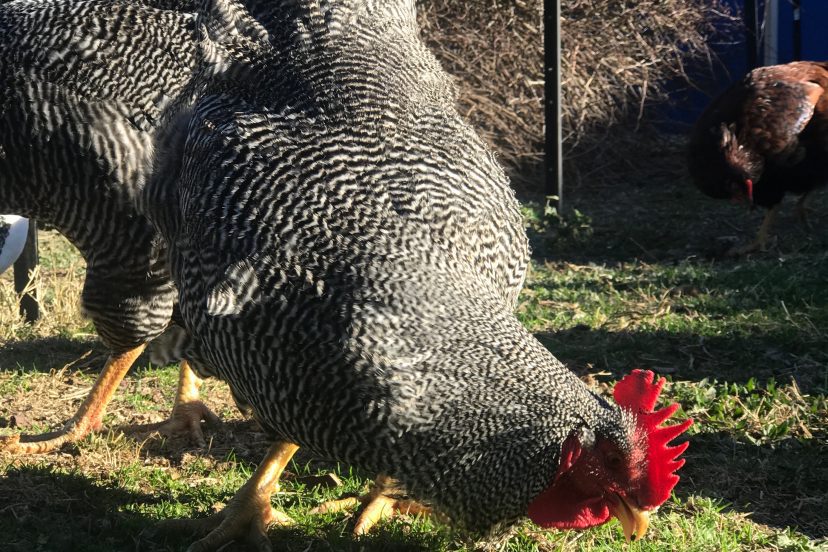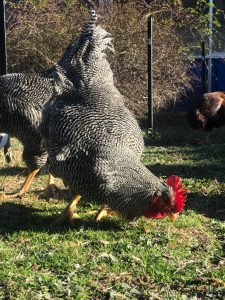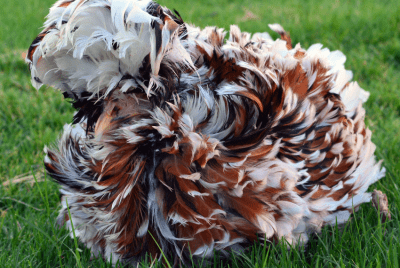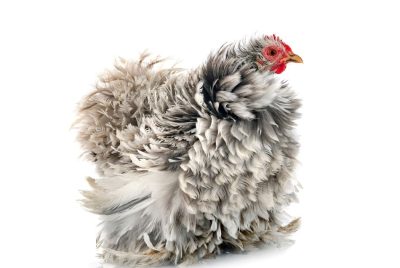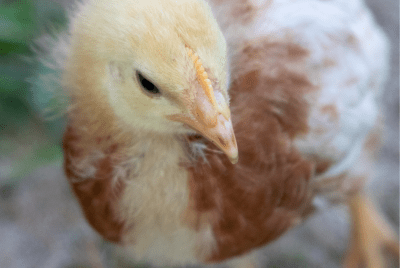Barred Plymouth Rock Chickens
Introduction to Barred Plymouth Rock Chickens
Overview of the Breed
Barred Plymouth Rock chickens, a popular American breed, are cherished for both their striking appearance and practical qualities. Originating in the mid-19th century, they are renowned for their distinctive black and white barred feathers, giving them a unique, striking look. Known for their robustness and adaptability, these chickens are perfect for both novice and experienced poultry keepers. They exhibit a friendly temperament, making them excellent backyard companions and a favorite among families. Beyond their aesthetic appeal, Barred Plymouth Rocks are dual-purpose birds, valued equally for their consistent egg-laying abilities and quality meat. This combination of beauty, temperament, and utility makes them a top choice for anyone looking to add a versatile and engaging breed to their flock.
History and Origin
The Barred Plymouth Rock chicken, a breed steeped in American history, originated in the United States around the mid-19th century. It was first exhibited as a breed in 1869. The result of crossbreeding Dominiques and Black Javas, the Barred Plymouth Rock quickly gained fame for its striking barred feather pattern, a genetic trait known as ‘cuckoo.’ Named after the town of Plymouth, this breed became a symbol of American poultry farming due to its robustness and productivity. It played a significant role in American agriculture, especially during wartime, for its dual-purpose utility, providing both eggs and meat to families across the nation.
Characteristics of Barred Plymouth Rock Chickens
Physical Features
The Barred Plymouth Rock chicken is renowned for its striking physical features, most notably its unique barred feather pattern. These feathers display alternating dark and light bars, creating a distinctive “cuckoo” appearance. The breed typically exhibits a single comb, with five upright points that are bright red, complementing their bright red wattles and earlobes. They possess a broad, deep body, indicative of their strength and vigor, with yellow legs and a moderately long tail. Hens and roosters are distinguishable by their size, with roosters being larger and more flamboyant. This distinctive appearance, combined with their sturdy build, makes them a standout in any flock.
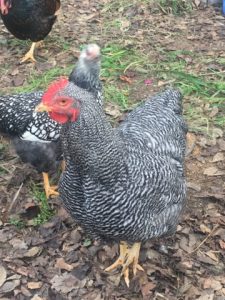
Temperament and Behavior
Barred Plymouth Rock chickens are renowned for their amiable temperament and easygoing behavior, making them a favorite among poultry enthusiasts. They exhibit a calm and friendly nature, often showing a degree of sociability with their keepers, which makes them excellent for families and interactive farm environments. These birds are not typically aggressive, which allows them to integrate well into mixed flocks. They are known for being hardy and active, often foraging for food, which contributes to their overall health and wellbeing. Their docile demeanor, coupled with a curious and alert disposition, makes them not only pleasant to raise but also entertaining to observe in a backyard or farm setting.
Raising Barred Plymouth Rock Chickens
Housing Needs
Raising Barred Plymouth Rock chickens requires attentive consideration of their housing needs to ensure their health and productivity. These birds thrive in a spacious, well-ventilated coop that protects them from extreme weather and predators. The coop should provide ample space for each bird to move freely, roost comfortably, and have access to nesting boxes for laying eggs. Adequate ventilation is crucial to prevent respiratory issues, while maintaining cleanliness helps deter parasites and diseases. Outdoor access is also important; a secure, fenced run allows them to forage and exercise, which is vital for their physical and mental well-being. Proper housing ensures these robust chickens live a healthy and happy life.

Feeding and Nutrition
Feeding and nutrition are crucial for the health and productivity of Barred Plymouth Rock chickens. A balanced diet is essential, typically consisting of a high-quality commercial poultry feed that provides a comprehensive blend of necessary nutrients. This breed benefits from additional calcium, particularly for laying hens, to ensure strong eggshells. Supplementing their diet with grains, vegetables, and occasional protein-rich treats like mealworms can enhance their overall health. Fresh water availability is imperative. While they are efficient foragers, providing a varied diet ensures they receive all necessary nutrients, supporting their growth, egg production, and the vibrant plumage that Barred Plymouth Rocks are known for.
Health and Care
Common Health Issues
Barred Plymouth Rock chickens, like all poultry breeds, are susceptible to certain common health issues. Respiratory ailments, such as bronchitis and pneumonia, are prevalent, often exacerbated by poor ventilation in coops. They can also be affected by parasitic infestations, including lice and mites, which thrive in unclean living conditions. Gastrointestinal parasites, like worms, are another concern, particularly in birds with access to outdoor foraging. Fungal infections, such as Aspergillosis, can occur in damp environments. Additionally, obesity can be a problem in this breed if not given enough space to exercise and if overfed, leading to other health complications like fatty liver syndrome. Regular health checks and a well-maintained environment are essential for preventing and addressing these issues.
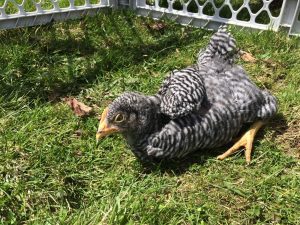
Preventive Measures and Treatments
Preventive measures and treatments are vital in maintaining the health of Barred Plymouth Rock chickens. Regular cleaning and disinfecting of the coop reduce the risk of parasitic infestations and respiratory illnesses. Providing a balanced diet and ensuring fresh water availability help in building robust immune systems. Vaccinations against common poultry diseases and routine deworming are essential preventive steps. For treating ailments, consulting a veterinarian for accurate diagnosis and appropriate medication is crucial. Isolating sick birds prevents the spread of infectious diseases within the flock. Additionally, ensuring adequate space for exercise and maintaining proper ventilation in the coop are key to preventing health issues.
Breeding Barred Plymouth Rock Chickens
Breeding Barred Plymouth Rock chickens involves understanding basic principles to ensure healthy offspring and the preservation of breed characteristics. Firstly, selecting robust, healthy birds with desirable traits is crucial. Ideal candidates should display the breed’s signature barred plumage, good temperament, and be free from any genetic flaws or health issues. Providing a stress-free environment with adequate space, nutrition, and care is essential for successful breeding. Understanding their mating behaviors and ensuring a proper hen-to-rooster ratio will enhance breeding success.
For effective breeding of Barred Plymouth Rock chickens, maintaining the proper hen-to-rooster ratio is essential. Generally, a healthy ratio is about 10 to 12 hens per rooster. This balance ensures that each hen receives adequate attention from the rooster without overtaxing him or causing stress and competition among the hens. An overcrowded rooster can lead to insufficient mating, while too few hens can result in over-mating, causing stress and potential injury to the hens. Striking this balance is crucial for successful fertilization, optimal egg production, and maintaining harmony within the flock, ultimately contributing to the health and productivity of both hens and roosters.
breeding stock for Barred Plymouth Rock chickens requires careful consideration to ensure the perpetuation of desirable traits and overall health of the breed. Ideal candidates should exhibit the breed’s hallmark features: strong, barred plumage, a robust physique, and a calm demeanor. It’s crucial to choose birds that are genetically diverse to avoid inbreeding complications. Health is paramount; only breed from chickens that are free from congenital defects and have a history of good health. Observing their behavior for signs of vitality and productivity, such as regular laying patterns in hens and good fertility in roosters, is also key. This meticulous selection process ensures the long-term health and quality of the Regular health checks and maintaining detailed records of lineage and breeding outcomes are also important for sustaining the breed’s quality and health across generations.
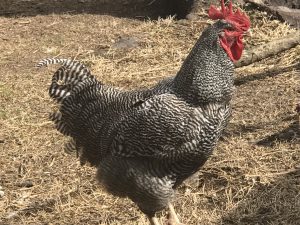
Selecting Breeding Stock
Selecting breeding stock for Barred Plymouth Rock chickens requires careful consideration to ensure the perpetuation of desirable traits and overall health of the breed. Ideal candidates should exhibit the breed’s hallmark features: strong, barred plumage, a robust physique, and a calm demeanor. It’s crucial to choose birds that are genetically diverse to avoid inbreeding complications. Health is paramount; only breed from chickens that are free from congenital defects and have a history of good health. Observing their behavior for signs of vitality and productivity, such as regular laying patterns in hens and good fertility in roosters, is also key. This meticulous selection process ensures the long-term health and quality of the breed.
Egg Production of Barred Plymouth Rock Chickens
Laying Capacity
The laying capacity of Barred Plymouth Rock chickens is a standout feature, making them a favorite among poultry enthusiasts. These hens start laying at about six months of age and can lay around 200 to 280 eggs per year, making them highly productive. Their eggs are medium to large in size with a brown shell. The laying frequency is consistent throughout the year, though it may slightly decrease during the winter months. Their robust nature contributes to this prolific laying capacity, ensuring a steady supply of eggs. This reliable production, combined with their hardiness, makes them an excellent choice for both backyard flocks and commercial operations.
Egg Quality and Characteristics
Barred Plymouth Rock chickens are celebrated for their high-quality eggs, which are a key aspect of their appeal. The eggs are typically medium to large in size, with an average weight of around 55 grams. They have a distinctive brown shell, which is not only appealing but also notably strong, providing good protection to the egg. The yolk is usually deep yellow, indicative of the nutritious diet these chickens consume. Their eggs are known for their rich flavor and nutritional value, making them a favorite for both culinary use and daily consumption. This consistent egg quality, coupled with their prolific laying capacity, makes Barred Plymouth Rocks a top choice for egg producers and hobbyists alike.
Utilization in Farms and Homesteads
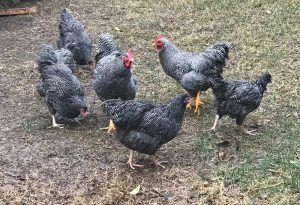
Dual-Purpose Qualities
Barred Plymouth Rock chickens are highly valued for their dual-purpose qualities, making them a versatile choice for both egg production and meat. As prolific layers, they provide a steady supply of large, nutritious brown eggs. In terms of meat production, these chickens develop a substantial amount of lean, flavorful meat, making them an excellent source of protein. Their robust physique contributes to a higher meat yield, suitable for various culinary uses. This dual-purpose nature allows small-scale farmers and backyard poultry keepers to efficiently utilize the breed for both eggs and meat, maximizing their investment and ensuring a sustainable and self-sufficient poultry operation.
Economic Benefits
Barred Plymouth Rock chickens offer significant economic benefits, especially for small-scale farmers and backyard poultry enthusiasts. Their dual-purpose nature, providing both high-quality eggs and meat, ensures a continuous source of food and potential income. Their hardy and adaptable nature reduces healthcare and maintenance costs, making them a cost-effective choice. These chickens are also efficient foragers, which can lower feed expenses. Furthermore, their popularity and attractive appearance increase their marketability, providing opportunities for selling eggs, meat, or live birds. Overall, the Barred Plymouth Rock breed represents a sustainable and profitable option for those looking to maximize their poultry investment.
The Community of Plymouth Rock Enthusiasts
Clubs and Organizations
Clubs and organizations dedicated to Barred Plymouth Rock chickens play a vital role in supporting enthusiasts and breeders. These groups provide a platform for sharing knowledge, resources, and best practices in breeding, health care, and management. They often organize events, shows, and competitions, fostering community among breeders and enthusiasts. Through these clubs, members gain access to valuable networks for acquiring stock, finding markets, and discussing breed conservation. Additionally, many of these organizations contribute to breed research and preservation, ensuring the long-term sustainability and genetic diversity of the Barred Plymouth Rock. Joining these clubs can be immensely beneficial for both novice and experienced chicken keepers.
Shows and Competitions
Shows and competitions are a highlight for Barred Plymouth Rock chicken enthusiasts, showcasing the breed’s beauty and conforming to standard traits. These events, often organized by poultry clubs and agricultural societies, provide a platform for breeders to present their best birds, judged on criteria like plumage, size, and overall health. Participating in these shows is not only a matter of pride but also an opportunity for breeders to gain recognition, share experiences, and learn from others. They foster a sense of community and help in maintaining breed standards. For newcomers, these events offer invaluable insights into the world of poultry breeding and the nuances of the Barred Plymouth Rock breed.
Challenges in Rearing Barred Plymouth Rock Chickens
Predators and Security
Predators and security are crucial concerns when raising Barred Plymouth Rock chickens. Common predators include foxes, raccoons, hawks, and even neighborhood dogs, posing significant risks to the flock. To protect them, robust security measures are essential. Coops and runs must be sturdy and well-constructed, with secure latching mechanisms to prevent predator intrusion. Using hardware cloth instead of chicken wire can provide better protection. Elevating the coop off the ground and securing it at night helps deter ground predators. Additionally, employing guardian animals like dogs or geese and using motion-activated lights can be effective deterrents. Vigilance and proper security infrastructure are key to safeguarding these valuable birds.
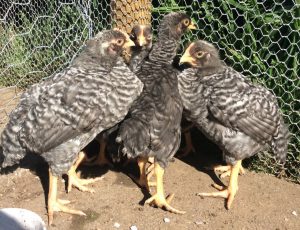
Environmental Considerations
Environmental considerations are pivotal in successfully raising Barred Plymouth Rock chickens. These birds are adaptable to various climates, but they require specific conditions to thrive. In hot weather, adequate shade and ventilation are essential to prevent overheating and ensure comfort. During colder months, a well-insulated coop protects them from harsh temperatures. Access to clean, unfrozen water year-round is crucial. Their living area should be kept dry to prevent diseases and parasites. Implementing measures to manage waste effectively, like regular cleaning and composting, contributes to a healthier environment. Understanding and addressing these environmental factors is key to maintaining a happy, healthy flock.
Tips and Tricks for New Owners of Barred Plymouth Rock Chickens
Getting Started
For new owners starting with Barred Plymouth Rock chickens, here are some essential tips and tricks: Begin with a small flock to manage learning curves more easily. Invest in a sturdy coop that provides safety, comfort, and space for each chicken. Learn about their dietary needs and provide a balanced diet with proper supplements. Ensure constant access to clean water. Familiarize yourself with their common health issues and preventive care. Spend time with your flock daily to observe their behavior and health, fostering a bond and allowing early detection of any issues. Lastly, connect with local poultry communities or online forums for support and advice.
Long-term Success Strategies
Achieving long-term success with Barred Plymouth Rock chickens involves strategic planning and consistent care. Key strategies include maintaining a diverse gene pool within your flock to ensure genetic health and vitality. Implement a rotational breeding plan to avoid inbreeding. Continuously monitor and adjust their diet to ensure optimal nutrition at different life stages. Regular health check-ups and keeping up with vaccinations and deworming schedules are essential. Invest time in learning about advanced poultry keeping techniques and stay updated on best practices. Building a network with other poultry enthusiasts can provide valuable support and knowledge sharing. Persistence in these areas will lead to a thriving, sustainable flock.
The Future of Barred Plymouth Rock Chickens
Conservation Efforts
Conservation efforts for Barred Plymouth Rock chickens are crucial to ensure their future sustainability and genetic diversity. Enthusiasts and breeders collaborate through breed clubs and agricultural societies to maintain and promote the breed’s standard qualities. There’s a focused effort on preserving the genetic purity of this heritage breed, avoiding cross-breeding that could dilute its distinct characteristics. These efforts also involve educating the public and new breeders about the breed’s historical significance and utility. By maintaining a robust population through responsible breeding practices and promoting its dual-purpose benefits, conservationists aim to secure the Barred Plymouth Rock’s place in modern agriculture and backyard farming.
Trends and Future Prospects for Barred Plymouth Rock Chickens
The future prospects for Barred Plymouth Rock chickens are bright, influenced by emerging trends in sustainable living and backyard farming. Increasingly, people are seeking self-sufficiency in food production, with a focus on organic and locally sourced foods. Barred Plymouth Rocks, with their dual-purpose qualities, fit perfectly into this paradigm. Their ease of care and adaptability make them suitable for both experienced farmers and novices. Additionally, there’s a growing interest in heritage breeds, which positions them as a popular choice for conservation efforts. With these trends, the Barred Plymouth Rock breed is likely to continue gaining popularity, ensuring its relevance and sustainability in the years to come.
Conclusion about Barred Plymouth Rock Chickens
Recap of Key Points of Barred Plymouth Rock Chickens
The Barred Plymouth Rock chicken, a heritage American breed, is celebrated for its distinctive barred plumage and robust nature. Ideal for both egg and meat production, these chickens are a perfect choice for small-scale farms and backyard flocks. They are known for their friendly temperament, making them great for families. Key considerations in raising them include providing proper housing, balanced nutrition, and vigilant health care. Their adaptability to various environments, combined with efficient egg-laying capacity and substantial meat yield, underscores their dual-purpose advantage. Active conservation efforts and a growing trend towards sustainable poultry keeping further cement their importance and enduring popularity in the poultry world.
Personal Reflections
As a breeder of Barred Plymouth Rock chickens, my journey with them has been deeply rewarding. Their friendly temperament, striking barred feathers and robust nature first drew me to this breed. They are so personable and their resilience has impressed me the most. Raising them has been an educational experience, teaching me the importance of responsible husbandry and the joys of self-sufficiency. Watching them forage and interact in their coop brings a sense of fulfillment. Their dual-purpose utility has been economically beneficial, while their presence enriches my daily life. These chickens are more than just livestock; they are a symbol of heritage, sustainability, and a connection to nature.
FAQs on Barred Plymouth Rock Chickens
1. Can Barred Plymouth Rock chickens tolerate cold weather?
Yes, they are well-suited for cold climates due to their robust build and dense feathering. However, it’s important to provide a dry, draft-free coop during winter to keep them comfortable.
2. What age do Barred Plymouth Rocks start laying eggs?
They typically begin laying eggs at about 6 months of age. This can vary slightly depending on factors like diet, environment, and overall health.
3. How long do Barred Plymouth Rock chickens live?
With proper care, they can live 6-8 years on average, although some may live longer under optimal conditions.
4. Are Barred Plymouth Rock chickens good for beginners?
Absolutely. Their hardy nature, friendly disposition, and low maintenance requirements make them an excellent choice for first-time chicken keepers.
5. Can these chickens be kept in an urban backyard setting?
Yes, Barred Plymouth Rocks are well-suited for urban backyards, given their adaptable nature and moderate size. However, always check local regulations regarding keeping poultry in residential areas.
Other Articles You Might Enjoy:
What 5 foods to avoid feeding chickens?
What foods chickens can eat and why?
Cutting chickens toenails when then are extra long
Gifts For Chicken Lovers
Please click on the picture you like best and you will be taken to a secure purchase page or link on the link below the picture.






